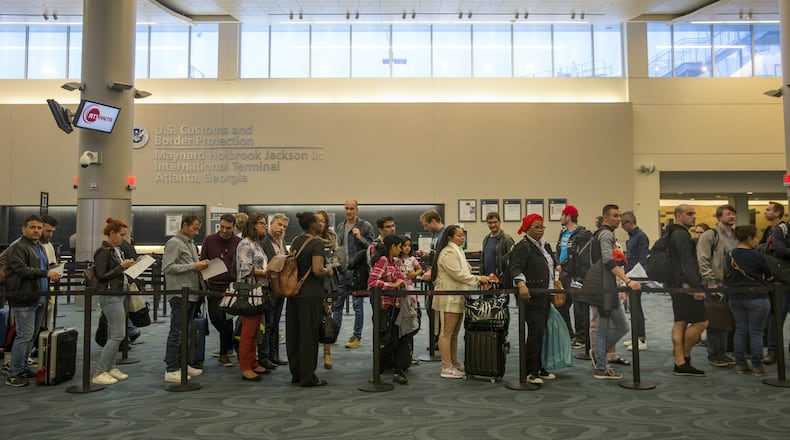The list of prohibited and restricted items is long, filled with obvious and not-so-obvious goods that can’t be brought into this country from another.
Custom agents at airports around the nation, including those at Hartsfield-Jackson International, regularly confiscate everything from illegal drugs to forbidden fruits. They also seize cash. Lots and lots of cash.
Arlington, Virginia-based law firm Institute for Justice says in a new study that, from 2000 to 2016, more than $2 billion was seized by U.S. Customs and Border Protection and other Homeland Security agencies at airports nationally, including $108.8 million at the Atlanta airport.
Sometimes, travelers get their money back. But the law firm is arguing that, too many times, it takes months — and that can have long-lasting consequences.
Often, the reason for the seizures is because of travelers’ failure to report when they are flying internationally with more than $10,000. People can travel with any amount of money, but are required to report when they transport more than $10,000 in currency in or out of the country. The report can be filed via an online form or by asking a CBP officer for a paper form at a port of entry.
Among CBP officers’ responsibilities is enforcing regulations on financial crimes aimed at preventing money laundering.
Of the money confiscated at Hartsfield-Jackson, in about 64% of the 1,287 seizures in that 17-year period, some amount of money was ultimately forfeited, according the Institute for Justice’s study of a U.S. Treasury forfeiture database.
The law firm argues that less than a third of the seizures of currency involve an arrest and wants to see the abolishment of administrative forfeiture, which allows a federal agency to seize assets without judicial involvement.
“Congress must reform civil forfeiture,” said Institute for Justice senior research analyst Jennifer McDonald in a written statement. “No one should lose their property without being convicted of a crime.”
Though the most common reason for currency seizures is failure to comply with reporting requirements, which is a violation of federal law, “currency seized by CBP at ports of entry has also been connected with bulk cash smuggling, counterfeiting, narcotics trafficking and other criminal offenses,” CBP said in a written statement.
McDonald says in her study that “the volume of airport cash seizures and the public stories of innocent victims suggest the federal government’s forfeiture programs are not just punishing the guilty.”
To get the money back, the traveler must prove that “the source and intended use of the currency was legitimate,” according to CBP. Currency is defined as cash, travelers checks, money orders and investment securities or other instruments in bearer form.
Some travelers may fly with large amounts of currency to pay for vehicles in cash, as a substitute for unreliable wire transfers or for other reasons, according to the Institute for Justice.
Customs and Border Protection said its officers often give travelers multiple opportunities to declare items when entering or exiting the country.
About the Author
The Latest
Featured


